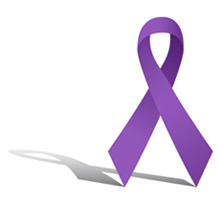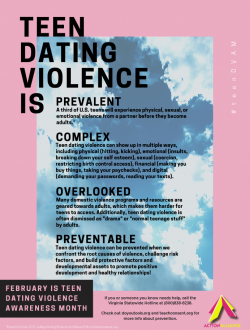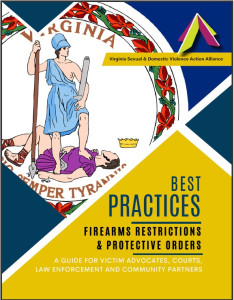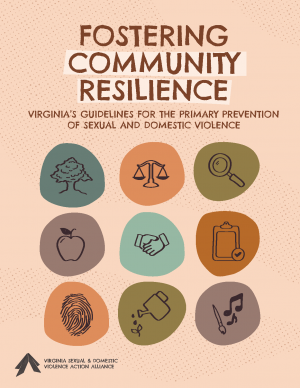Resources Library: Multidisciplinary
Start a Search:
Family and Intimate Partner Violence Fatality Review Protocol (3rd edition)

Team Protocol and Resource Manual (3rd Edition)
This Protocol and Resource Manual that supports the development of local and regional domestic violence fatality review teams in Virginia. The resources and materials included here provide directions on death review in the area of domestic violence homicides.
Published by: Virginia Department of Health, Office of the Chief Medical Examiner. December, 2009. 98 pages.
February is Teen Dating Violence Awareness Month

February is Teen Dating Violence Awareness month. This poster outlines some common misconceptions about teen dating violence as well as offering some action items toward preventing it. For more information, see doyoutools.org and teachconsent.org.
Firearms Restrictions and Protective Orders in Virginia

Recent changes in Virginia code pertaining to firearms, firearm restrictions, surrender of firearms, and new Substantial Risk Orders can substantially impact the lives and safety of survivors of intimate partner violence. To assist survivors in making decisions regarding petitioning for protective orders and with safety planning, it is essential that advocates are knowledgeable about both the legal remedies as they pertain to firearms and the processes and procedures in their communities for implementation of these new remedies.
The Virginia Domestic Violence and Firearms Workgroup worked with local, state, and national partners to create new resources to support implementation of firearms restrictions in communities across Virginia. The toolkit is intended to serve as a foundational resource for sexual and domestic violence advocates – in their work with survivors and communities – to maximize safety and to ensure compliance with Virginia law.
For more information on how to best use these tools and/or for technical assistance and training to support implementation in your community, please contact the Virginia Sexual & Domestic Violence Action Alliance at training@vsdvalliance.org.
To download this resource, click here.
Forced Marriage is Abuse
The Universal Declaration of Human Rights (Article 16) states that “marriage shall be entered into only with the free and full consent of the intending spouses.” As such, forced marriage is a clear violation of human rights.
The tactics used to force someone into marriage or to punish him or her for leaving a forced marriage are also human rights violations. The life of someone forced into marriage may consist of daily abuses, including rape, forced labor, domestic violence, and deprivation of the right to education, which can result in severe and long-term harm, including deteriorating medical and mental health.
The Tahirih Justice Institute's www.preventforcedmarriage.org website is an incredibly useful tool that serves as a resource library for service providers and includes over 10 recorded webinars on different topics related to providing services to forced marriage survivors and individuals at risk, as well as research papers, including the 2011 survey study on "Forced Marriage in Immigrant Communities in the United States", recommended books, and a news archive.
Also, check out the Forced Marriage 101 Webinar and the attached brochure and fact sheet to learn more about how forced marriage impacts individuals in the United States.
Fostering Community Resilience: Virginia’s Guidelines for the Primary Prevention of Sexual and Domestic Violence

The purpose of Fostering Community Resilience: Virginia’s Guidelines for the Primary Prevention of Sexual and Domestic Violence is to assist local communities in creating primary prevention strategies that focus on identifying and dismantling the root causes of sexual and domestic violence. The Guidelines have been built on the foundations of two core concepts: social justice principles and public health models.
Visit https://guidelines.vsdvalliance.org/ for more information about each guideline, in addition to resources and tools for prevention program development. To download the PDF of the guidelines, click this link.
Published by the Virginia Sexual & Domestic Violence Action Alliance, 2022. 34 pages.

